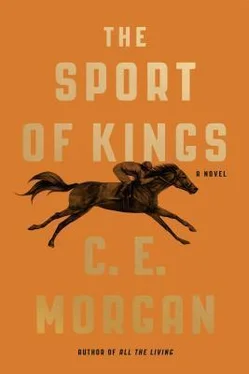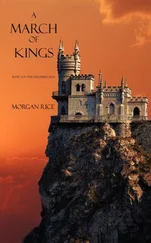At midday, as he’s gathering berries for them, she makes a deep, chesty sound, what he initially mistakes for singing under her breath, but when he turns, she’s bent and hesitant, sweating, her hands spread for balance in the air. When he goes to her, trouble on his brow, she straightens up and blanks her face, says, “I’s fine. Walk on, Scipio.”
On the last day of their walking, the land grows increasingly hilly and curvaceous, much more so than Scipio had expected. No more obliging fields with forest enclosure, but hikes so steep that Scipio is hauling Abby up the inclines and her whole body trembles with the effort. She speaks no words today, as if every faculty she possesses, including speech, is sacrificed for this last consuming effort and it is the last, because at the break of the hill, she stumbles into Scipio, who has stopped suddenly. Through a natural window in the trees, they spy the Ohio River down below, that dark dividing line made by God but named by men, and they are standing at the watershed where all of life flows north to freedom. Scipio raises his arm and points and she peers around his shoulder with a hard sigh. He realizes with some dismay that though he can see the red brick and smoke of Cincinnati to the west, they are some distance from the city and there’s nothing to be done about it. They’ll swim from the bank directly below them.
He searches the northern slope of the hill, where sweet gum, mulberry, and beech trees congregate in clusters, until he finds a thick limestone berm, where the hill just begins its precipitous, gravelly fall to the river. The thin, level space is sheltered by the broad cordated leaves of plants so tall on their scapes, he initially mistakes them for trees. A mass of verdant foliage encases the ledge, making a cool shelter there.
He says, “This is where we gonna spend the night. I aim to wake you when it’s still dark, and then we gonna climb down and swim. Save your strength, Miss Abby.”
She nods her head and Scipio detects the sharpening of fear in her eyes as she contemplates the hillside and the rustling river far below, but when he sits under the leaves, she follows his lead meekly and is almost instantly asleep, snoring gently, though fitting and starting, her mind darting here and there just beneath sleep’s surface — he recognizes the motion, because he sleeps like that too, his spirit riven by fear. His brief dreams are like jars shattering. For twelve days, he has lived in terror. He shudders, turning his head away from Abby’s bedraggled, restless form and huddling deeper into himself, feeling not just weary but crippled in his pained exhaustion, so that if a patroller were to point the snout of a rifle into their leafy hut, Scipio would be altogether unable to run, or even rise. But they are well hidden in the foliage and though he can just spy the quick river below, the vegetation shuts out the light, forcing an early evening in their bower, over which evening slowly descends: First, a crepuscular smudge at the edges of eastern time and the sky is brushed with crimson and damask, then shadows are knit from the darkest remnants of day, the dark sprawls, daybirds mourn and nightbirds vivify, bony egrets sweep along the tributaries of the river and their flapping wings sound like brown paper crinkling, and bank swallows burrow in the dirt banks, the falling light is gay laughter in another room, the waterside plants hang sorrowful heads from slender petioles, the river speaks in low, brooding tones, the river is a coal seam exposed in a hollow, the river is black velvet unspooled from its bolt, the river is a vein opened, the river is decay, every fine line grown indistinct in the gloaming. A bird trills from the southern shore and the northern shore echoes the call, near intimates but never intimate, now a single lush billow of wind suggests rain and a muggy wet woolen is tossed over the shoulders of the land, the river valley swaths herself in wedding gauze, misty evening hums, this is a shroud or a mother’s shhhhhhhh, a droning prayer, this river is a lullaby and a dirge, this river is a promise made in daylight but upheld by night, and soon there will be no color because the night is coming on and nameless animals now call roll for the absent overseer and beneath the crenellated edge of the dew-soaked plants, Scipio’s eyes are draping shut against his will. But the crooning of a mourning dove or a mockingbird — the latter so infinitely variable, who can distinguish them — pierces the air and starts him from his momentary rest. He forces a final reconnoitering glance at the river, which holds one last fistful of scattered light, and he thinks, it ain’t so wide after all, and then he grasps the absurdity deep down in the marrow of his bones, how this very night the mask of slavery will be lifted from his face by geography, this arbitrary fact of twelve hundred feet, this quarter mile God laid down for beauty’s sake. Your humanity depends upon the ground beneath your feet. You cannot straddle this river. You must choose a side.
Later, he wakes from fitful sleep in the dark but forces himself to be still, waiting for that precise moment when the night has grown late but the morning star is yet to rise. He waits and waits, until he can’t bear it another minute, and then he wakes Abby. She comes to with a soft cry.
“We got to go now,” he says, and they slip out from under the shelter of the plants into the dark, which presses them from both sides. They are suddenly electric with wakefulness. Hand in hand, they navigate the descent to the flat plane of the river, stumbling on exposed roots and the frangible soil of the hillside, the slippery spots where exposed limestone is slick with dew and the scat of animals that passed here just hours before. Through masses of tangled vegetation, Scipio catches brief snatches of the river, and he knows it is the river only because it is blacker than any other black in the night. Just as planned, he has arrived on a moonless night so there is no light to play on the water, or to light their figures for any patrollers who might be waiting and watching.
Abby cries out suddenly and Scipio whips around to shush her, but she is doubled over, gripping her belly with fingers that appear carved from stone.
“Miss Abby!” he whispers, but she doesn’t reply, doesn’t move. “You close? You can’t cross with no baby pains!”
Still doubled, Abby grapples for his shirt and grips him firm to keep him from leaving, but he has no intention of leaving, no intention at all. He can’t run away from this woman. He has a vision of them crossing, it’s firm in his mind now like a story told to him a long time ago, a story which he now believes with all of his heart.
Abby rises up to her full height and, for once, she isn’t begging: “I telled you I’s crossing dis night. All my chilluns gived me de pain for three days fore dey come. Dis de same, and I’s swimming.”
“Miss Abby, you’re fixing to drown if you cross this river with the pains.”
She breathes through her nostrils rapidly, shoulders quaking, but fixes him with a wide-eyed stare, which is only half-wild. “Iffen I pain, den you hold me up. You hear?”
He stares at her a moment, then says, “Miss Abby…”
“You hold me and dis here poor baby up.”
“Yes.”
“Move den,” she orders, and they move down the last stretch of oak-clogged hill, which slopes to an alluvial flat pierced with branchless, leafless tree stumps like fat spears in the ground, and finally, sweaty with effort and fear, they stand at the edge of the moving water and Scipio is staring down at the great cinereous boulders scattered on the beach as if a kindly god has placed them there for a man and woman to hide alongside. Abby says, “Thank you, Lord, I’s brung to de River Jordan and I’s gone wade in de water. I’s never gone be de slave a de white man no more, only de slave a God.”
Читать дальше
Конец ознакомительного отрывка
Купить книгу












